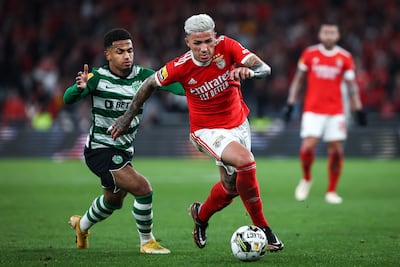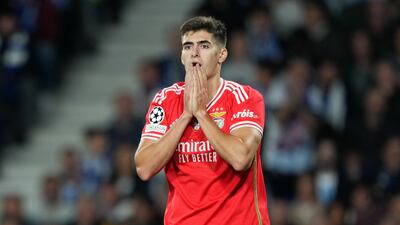If you are a fan of Benfica, nostalgia is part of the journey. The long-range version reaches to when the club were truly kings of their continent, winners of the European Cup twice in the 1960s.
The modern version is seasonal. It’s about very fine players, making a swift impact and then departing. It’s about what’s left in their slipstream.
A 12-month rewind would carry nostalgic benfiquistas, as followers of Lisbon’s most celebrated sporting institution are known, to a proud modern peak. This time last year, Benfica were top of their domestic table and on a remarkable run, having dropped only two points out of a possible 39, surging towards a record-extending 38th league title.
They had topped their Champions League group, leaving Paris Saint-Germain in second spot and, in beating Juventus twice, they consigned the Italian giants to an early exit from the competition.
A year on, the picture is gloomier. The early exit from Group D of this Champions League is Benfica’s. They host Inter Milan on Wednesday facing the strong possibility of no European football at all in the new year. They have lost all four games so far.
This is some comedown. Benfica are lately used to falling out of club football’s most prestigious tournament at its business end and with a swagger. In 2021/22 and 2022/23, they left at the last-eight stage after high-scoring draws, 3-3 against Liverpool and Inter, who were both eventual finalists.
Why the sharp drop-off? Perhaps another glance back 12 months tells part of the story. Then, the World Cup was under way in Qatar and while benfiquistas could feel some pride in the presence there, with Portugal, of two of their young stars, defender Antonio Silva and striker Goncalo Ramos, there was also on display a wider endorsement of the club’s long-term reputation as a superb nursery and hub for talent. The Portugal of Ruben Dias, Joao Cancelo, Bernardo Silva and Joao Felix is built around ex-Benfica men.
Qatar 2022 would turn out very well for the club’s treasury, too. There were Benfica players who returned from it with gold medals – Argentina’s veteran defender Nicolas Otamendi and the young midfielder Enzo Fernandez.

The latter was a newcomer to Lisbon, freshly signed from River Plate for an initial fee of barely €12 million. Fernandez’s performances at the World Cup excited Chelsea. They could hardly wait to have him. By the time Benfica had completed January negotiations for his move to London, the sale price, with add-ons, had climbed to more than €120 million.
River Plate were entitled to a large slice of that, but the profit, over a six-month turnaround, still cleared over €60 million for Benfica. They were well aware, too, that Goncalo Ramos’s hat-trick in Portugal’s thrashing of Switzerland in the last-16 in Qatar had opened eyes to his precocious talent. Sure enough, PSG took him on loan, with an obligation to buy him for €65 million in 2024, during the summer.
Track the clubs who shop heavily at Benfica and it’s a list of Europe’s big achievers: Chelsea, Champions League winners in 2021; PSG, Champions League finalists a year earlier, when they were beaten by Bayern Munich, who in 2016 paid Benfica €35 million for Renato Sanches, a deal sealed while the midfielder was only 18. Joao Felix was only 19 when Atletico Madrid lured him from Lisbon in 2019 for over €125 million.
There’s been big money from Liverpool, whose response to finishing second in the European Cup in 2022 was to refresh their attack with Darwin Nunez, Benfica receiving €80 million for the Uruguayan. As for Manchester City, the Champions League holders, they have thrived on ex-Benfica men as much as Benfica have earned well from selling to City the likes of Dias, and goalkeeper Ederson.

It has been a consistently excellent business model, bringing in well over €600 million in the past five years, and a necessary way of maintaining a competitive edge in Europe, alongside clubs who generate far greater wealth from broadcast income than any Portuguese club can.
And the edge has usually stayed sharp. Benfica’s teenagers have been finalists in two of the last three Uefa Youth Leagues, the seniors have been quarter-finalists in the last two Champions League seasons.
While fans can ruefully wonder how strong the team would have been had even a few of the stars stayed longer, coincided more, there are used to imagining that when a Darwin leaves, a Ramos will emerge in his place.
Not so this season. The Champions League campaign has been, acknowledges Benfica president and former star Rui Costa, a “failure”. He has reassured supporters, though, that the loss of knockout phase revenue does not mean they have to sell players in January. Small comfort.
Fans are entitled to think the club have sold too many, too soon already.


